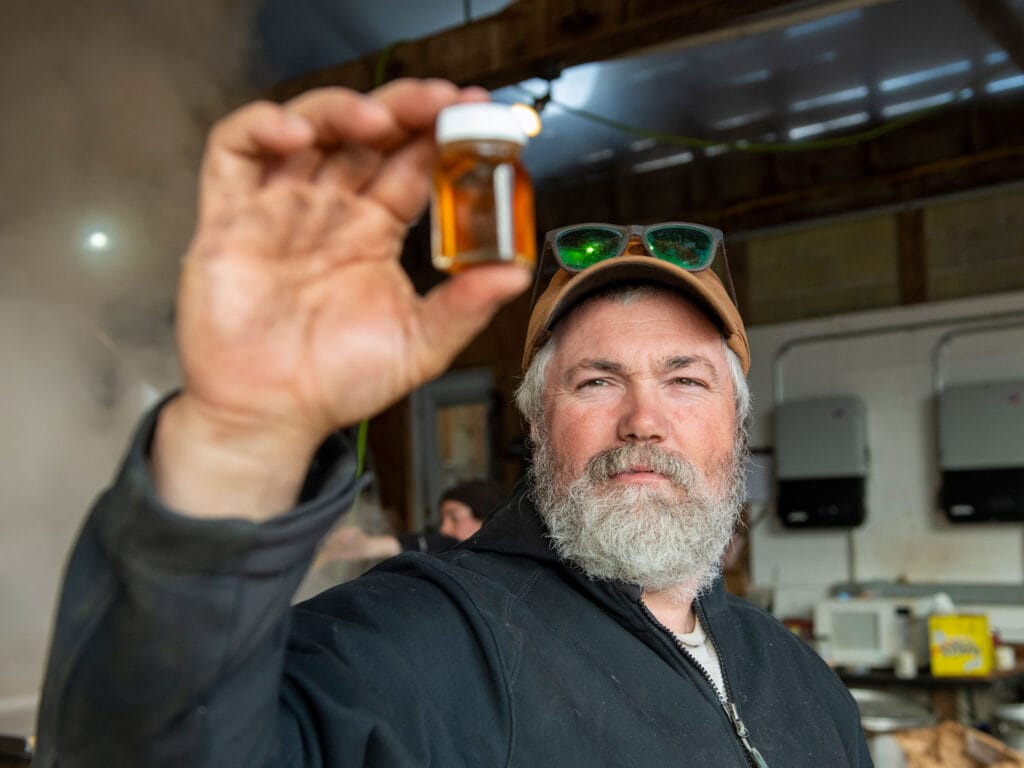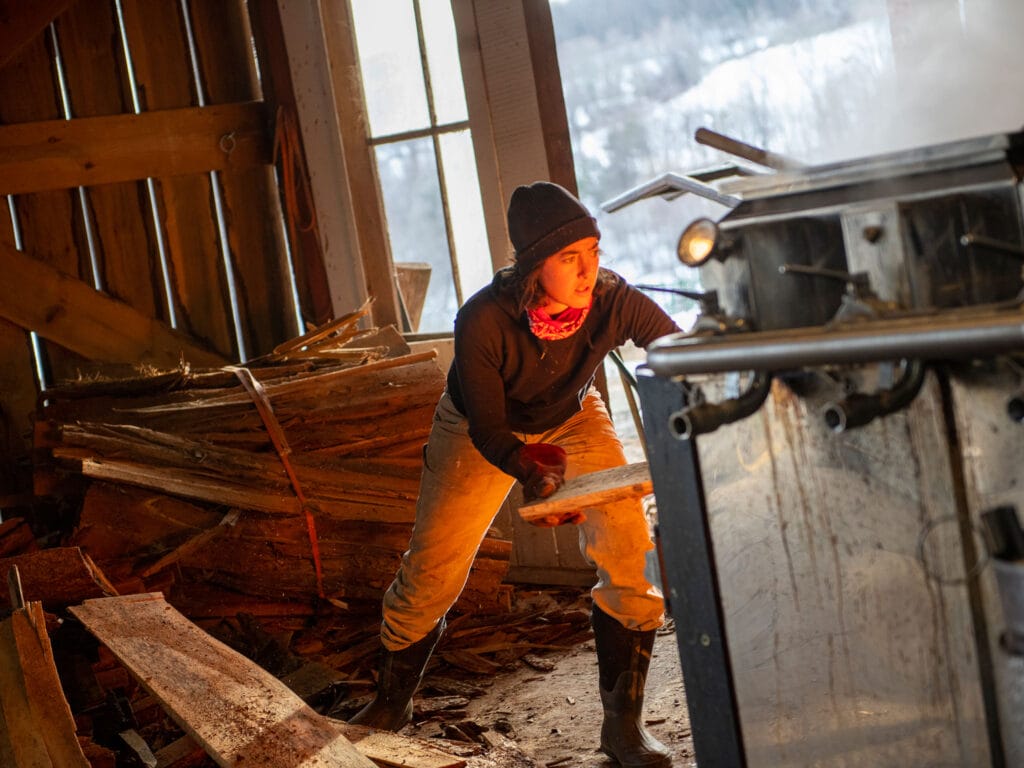Sugaring at Dummerston’s Bunker Farm
6 min read / March 28, 2024 / By Rachel Mullis
Can't find what you're looking for? Please contact us.
6 min read / March 28, 2024 / By Rachel Mullis
Winters in Vermont are long, unless you’re a sugar maker. Maple season starts on New Year’s Day at Bunker Farm in Dummerston. Over the next ten weeks, the crew works flat out to pull in as much syrup as possible before the taps run dry. By that time, spring is well underway.
The farm is less than two miles from the Connecticut River and New Hampshire border, nestled in a hollow between hills of oaks, basswood, white pine, and, of course, sugar maples. Two married couples live there with their families. We helped them buy and conserve the land in 2014 so they could start their farm.
The farmers also sell pasture-raised meat and annual and perennial flower starts. But for a stretch of time, sugaring is all-consuming.

Noah Hoskins checks a sample of syrup.
Dummerston is in southeastern Vermont, which is jokingly referred to as the state’s banana belt because temperatures run a few degrees warmer than in the northern Champlain Valley. Being on the warm, sunny side of the state means an earlier start to the growing season.
Each January, equipment is cleaned, lines are checked, and tanks are set. The crew walks the hilly 100-acre sugarbush to place 7,200 taps by hand. They wait and watch as the forest wakes up. Even a few tenths of a degree can make a difference in how or whether the sap will flow.
“You’re just so in tune with what the forest is doing at this really interesting, dynamic time,” said co-owner Noah Hoskins. “It’s easy to assume that what’s happening on February 15th is similar to what’s happening on March 7th, but it’s really different, every year.”
Mike Euphrat, Noah’s brother-in-law, oversees the farm’s sugaring operation. He often works 48 hours straight during the height of the season to keep up with demand. The syrup is sold on Bunker Farm’s website, at their farmstand, and wholesale to Bascom Maple Farms.
Noah oversees the farm’s meat business, with a little help from Patches, a 12-year-old cow who isn’t above scolding naughty calves who get out of line. But he still puts in long hours sugaring—something like six a.m. to midnight during the most intensive weeks between late February and mid-March.
“It’s a brief season, so we really have to push it hard,” Noah said.
Fortunately, there’s family to lean on. The farm’s other co-owners—Noah’s wife Helen O’Donnell, a garden designer who runs the farm’s flower business, and her sister, Jen O’Donnell, a teacher who is married to Mike—keep the business operations running and the crew fed.
A handful of neighbors play other key roles in producing Bunker Farm’s syrup, including Hannah Phillips who runs the evaporator, and Jesse Ackemann who helps tap trees, haul sap, and check vacuum lines. The community also plays a big role. The sugar house is open all day, every day, for tasting and buying, and sometimes for live music and dancing.
Sugaring is an opportunity to get out of the house and gather during that time of year, Noah explained. The fire is going, people are tasting syrup, and everyone is happy to see each other.
“There’s movement and intensity and community,” he said. “It’s an incredible thing that is hard to replicate in other parts of life.”

Hannah Phillips keeps the fire going for the evaporator, boiling the sap down to make maple syrup.
It’s unclear how sugaring culture will change as technology continues to evolve and climate change brings warmer, more erratic weather patterns. Some sugar makers have begun experimenting with longer seasons, and even late-fall tapping. Noah says that one of the largest sugar makers in the area had 8,000 taps out in mid-December of 2023.
“The advent of high-vacuum tubing systems means that you can have your taps out a lot longer and that you aren’t limited to the very best days,” he said. “You have a much wider range of climactic conditions where you can be harvesting sap.”
For now, sugaring at Bunker Farm is still a brief, all-out sprint. By the time the sap stops flowing, the crew is, well… tapped. All except for Helen, whose growing season is kicking into high gear. She starts her perennials in January and February and her annuals in March, and keeps sowing until she’s done. Her sprint is the last weeks of April and all of May, she said.
Meanwhile, Noah’s meat business is more of a marathon. Each aspect of the business has its own rhythm. But what’s constant is that everyone pitches in when it’s crunch time. Between four owners and a supportive community behind them, there’s always someone to lend a hand.